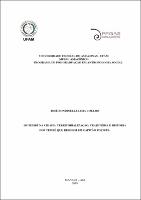| ???jsp.display-item.social.title??? |


|
Please use this identifier to cite or link to this item:
https://tede.ufam.edu.br/handle/tede/7883| ???metadata.dc.type???: | Tese |
| Title: | Os Tembé na cidade: territorialização, trajetória e história dos Tembé que residem em Capitão Poço/PA |
| ???metadata.dc.creator???: | Coelho, José Rondinelle Lima  |
| ???metadata.dc.contributor.advisor1???: | Bruno, Ana Carla dos Santos |
| ???metadata.dc.contributor.referee1???: | Ortolan, Maria Helena |
| ???metadata.dc.contributor.referee2???: | Silva, Raimundo Nonato Pereira da |
| ???metadata.dc.contributor.referee3???: | Menezes, Thereza Cristina Cardoso |
| ???metadata.dc.contributor.referee4???: | Maximiano, Claudina Azevedo |
| ???metadata.dc.description.resumo???: | Os Tembé do Guamá estão em aldeias às margens do rio que dá nome à Terra Indígena Alto Rio Guamá, mas não apenas na Terra Indígena (doravante TI), os Tembé do Guamá são as unidades familiares que residem fora da referida TI, que estão nas comunidades que se formaram no entorno desta, em cidades como Capitão Poço e Ourém. Tais comunidades e cidades mantêm uma relação estreita com a história dos membros deste grupo indígena. Diante disso, esta pesquisa é uma análise das identidades dos Tembé por meio de um estudo das redes de relações dos diversos agentes sociais que busquei dar destaque neste trabalho antropológico, os quais são indígenas (sejam os que residem nas aldeias, ou os que residem na cidade de Capitão Poço) e não indígenas (tanto os que vivem na cidade, quanto os que vivem em comunidades próximas à Terra Indígena). Desta forma, as análises que foram feitas precisam ser pensadas para além de suas ligações com agentes indígenas de outras aldeias, mas podem ser incluídos, também, quilombolas e ribeirinhos. Assim, essas relações me permitiram propor uma análise da conformação do processo de territorialização do grupo, além de viabilizar a tessitura de entendimentos das várias situações históricas as quais esses agentes indígenas foram submetidos, o que foi feito a partir da adoção de uma abordagem de cunho processual. Portanto, considero que, tanto em relação à construção da imagem do índio pela academia, assim como a relação desses agentes indígenas com os não indígenas e com questões ligadas a momentos de embates e alianças entre os Tembé do Guamá com instituições como o Serviço de Proteção ao Índio, Fundação Nacional do Índio, Secretaria Executiva de Educação do Estado Pará e a demonstração das trajetórias de tais agentes nativos e demais agentes com quem esses mantêm relações, foram relevantes para esta pesquisa que se propôs a pensar sobre os processos que levaram a conformação das diversas identidades dos Tembé. |
| Abstract: | The tembé of the Guamá live in villages on the banks of the river that gives name to the Indigenous Land Alto Rio Guamá, but not only in the Indigenous Land (hereinafter IL), the tembé of the Guamá are the family units residing outside of the indigenous land, who are in the communities were formed around it, in cities like Capitão Poço and Ourém. Such communities and cities have a close relationship with the history of this indigenous group members. In view of this, this research is an analysis of the tembé's identities through a study of the networks of the relationships of the various social agents that I sought to highlight in this anthropological work, which are indigenous (whether they live in the villages, or those who live in the city of Capitão Poço) and non-indigenous people (both those who live in the city and those who live in communities close to the Indigenous Land). In this way, the analyzes that have been made need to be considered beyond their links with indigenous agents from other villages, but quilombolas and riverside dwellers can also be included. Thus, these relations allowed me to propose an analysis of the conformation of the group's territorialization process, in addition to making it possible to weave understandings of the various historical situations to which these indigenous agents were subjected, which was done from the adoption of a procedural approach. Therefore, I consider that, both in relation to the construction of the Indian's image by the academy, as well as the relationship of these indigenous agents with non-indigenous people and with issues related to moments of conflicts and alliances between the Tembé of the Guamá and institutions such as the Protection Service to the Indian, National Indian Foundation, Pará State Executive Education Secretariat and the demonstration of the trajectories of such native agents and other agents with whom they maintain relations, were relevant to this research that set out to think about the processes that led to the conformation different Tembé identities. |
| Keywords: | Aldeias indígenas Índios Tembé Capitão Poço (Pará) Etnologia indígena Antropologia indígena |
| ???metadata.dc.subject.cnpq???: | CIÊNCIAS HUMANAS: ANTROPOLOGIA |
| ???metadata.dc.subject.user???: | Índios Tembé Etnologia indígena Trajetória Memória História |
| Language: | por |
| ???metadata.dc.publisher.country???: | Brasil |
| Publisher: | Universidade Federal do Amazonas |
| ???metadata.dc.publisher.initials???: | UFAM |
| ???metadata.dc.publisher.department???: | Instituto de Filosofia, Ciências Humanas e Sociais |
| ???metadata.dc.publisher.program???: | Programa de Pós-graduação em Antropologia Social |
| Citation: | COELHO, José Rondinelle Lima. Os Tembé na cidade: territorialização, trajetória e história dos Tembé que residem em Capitão Poço/PA. 2019. 219 f. Tese (Doutorado em Antropologia Social) - Universidade Federal do Amazonas, Manaus, 2019. |
| ???metadata.dc.rights???: | Acesso Aberto |
| ???metadata.dc.rights.uri???: | http://creativecommons.org/licenses/by/4.0/ |
| URI: | https://tede.ufam.edu.br/handle/tede/7883 |
| Issue Date: | 4-Dec-2019 |
| Appears in Collections: | Doutorado em Antropologia Social |
Files in This Item:
| File | Description | Size | Format | |
|---|---|---|---|---|
| Tese_JoséRondinelle_PPGAS.pdf | Tese_JoséRondinelle_PPGAS | 10.37 MB | Adobe PDF |  Download/Open Preview |
This item is licensed under a Creative Commons License





